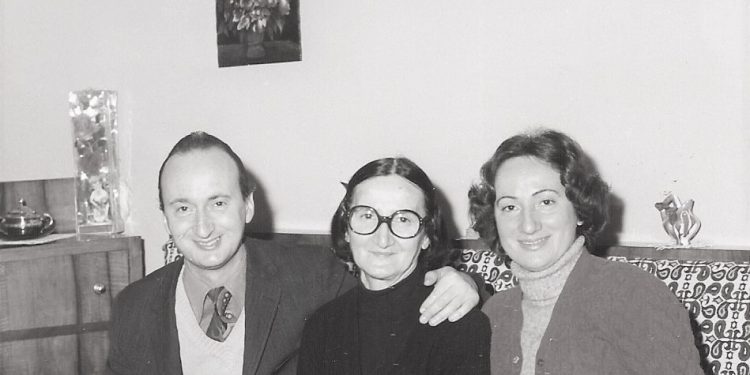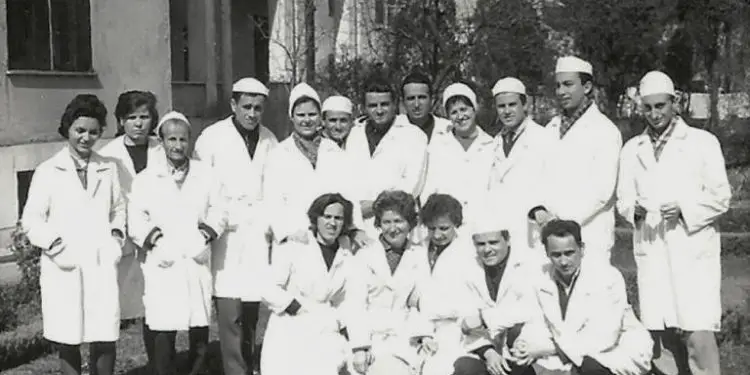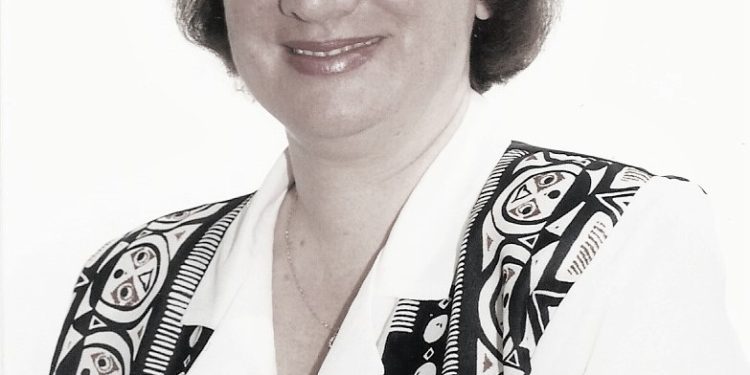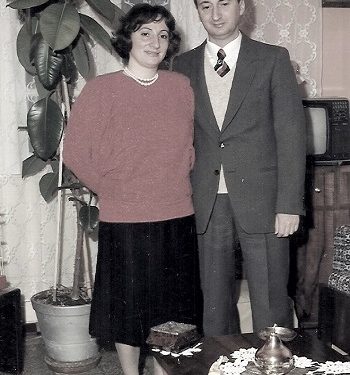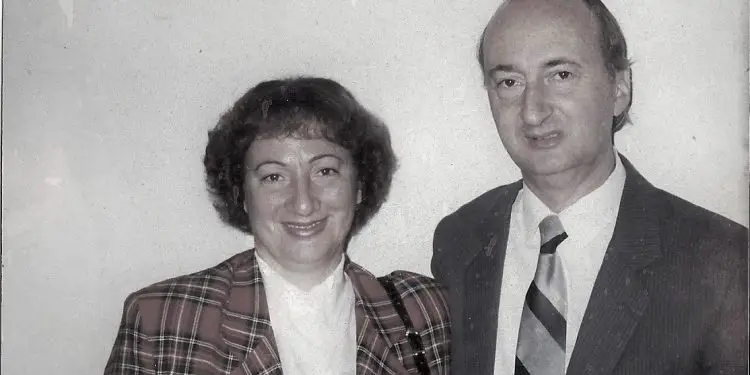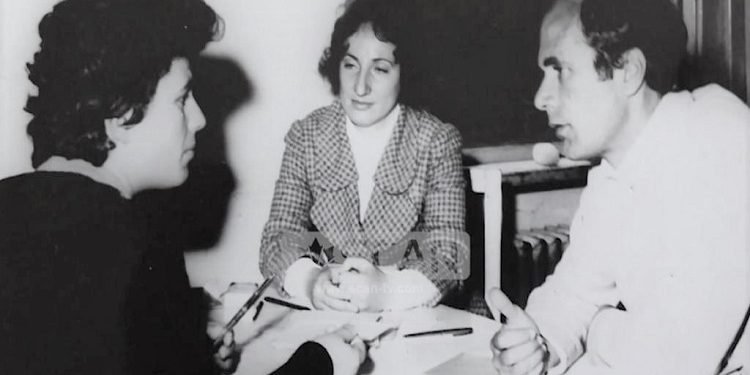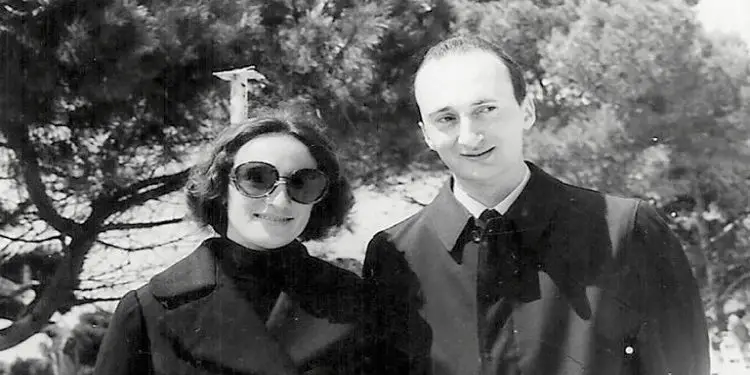By Dashnor Kaloçi
Part four
Memorie.al / Born and raised in a family with intellectual and aristocratic traditions, both from her father’s side (originating from Narta and Vlora), and from her mother (from the city of Durrës), even from four generations of graduated from the most popular universities in Europe, in various branches such as; Law, Economics and Medicine, even the older brother, (one of the icons of Albanian Medicine, for almost half a century), could not “deviate” from the family gene and the path that their forefathers had chosen and traveled, in the current of life. In fact, since she has gone a little further, since in addition to teaching as a lecturer, she has also engaged in active politics, being elected not only as a member of the Albanian Parliament, but also as the vice-president of the Parliament, although for a short time, as long as it lasted that legislature. Taking into account the branch where he graduated and the profession of university lecturer, which he practiced until he retired, and also his brother, who specialized in one of the best university clinics in Paris, at the beginning of the 70s not only has life not “petted” her, but it has also brought her a lot of vicissitudes in her journey and professional career. Due to the class struggle, the Party Committee of Region No. 1 of Tirana, labeled her as: “The daughter of a bourgeois lawyer, who studied in Switzerland before the liberation and she is not worthy to study…”, which deprived her of the branch she had chosen to follow. All these already belong to a past time, but due to our continuous requests, Prof. Dr. Margarita Qirko, is “forced” to break the “code of silence” that she has meticulously implemented until today, not remembering those past times, and speaking for the first time, for Memorie.al, in a interview, about the history of the family, and hers.
Continues from last issue
Ms. Margarita, what did you do after that?
In those conditions, I returned to my mission, my students, to continue my path, irreversible for their professional training. I had only one school year, since I had left the University, and after I applied, I was accepted as a lecturer in the department where I had been. Meanwhile, I was in the Democratic Party, as a member of the Presidency and the National Council of the DP.
How do you remember your first days back at university?
In the first days of September 1997, I climbed the stairs of the Polytechnic University and ran into my friend, with whom I had been working at the University for 17 years. I turned to him with a smile to greet him and was stunned by the way he avoided me and left. “Disappointment leaves us silent on the outside, inside a restless noise of fragments of a broken soul,” says the great Fabio Privitera.
I continued up the stairs to go to the cathedral and noticed that everyone avoided meeting me. In the department, those lecturers who were present had a cold attitude towards me. I felt the same as in the previous regime, before the 90’s, with the class struggle weighing on the shoulders and a total disregard for the 17 years we had worked together, giving you kindness and human behavior.
How would you explain today, after so many years, the attitude of those colleagues?
People change, disappoint you, forget you, no matter how much you love them, you can’t always keep them close to you, because suddenly you are unnecessary for them.
Were there any colleagues who welcomed your return to the faculty auditoriums?
Of course. for example, I remember and pray that my Numerical Analysis professor at the University, Vasil Zenjo, whom I had as head of the Numerical Analysis sector in the department where I worked, may rest in peace. He was a socialist, but a very good man. He took me to coffee and gave me the courage to keep moving forward, with my values, and he promised me that we would start writing a Numerical Analysis book for engineering majors, since it didn’t exist yet for students.
I was very relieved spiritually and started my mission, at the same pace as before. My focus was to think about the chapters I was going to write, for the Numerical Analysis theory book. In this period, the “Intereg” project for the specialization of lecturers was being implemented in our department, and all colleagues went for specialization 1 and 2 times, in Bari, Italy. The only one who was excluded was me.
How would you explain this phenomenon?
Such acts of revenge were not acceptable in a country where human rights were protected by law. Professor Zenjo, as the head of the department, proposed that I complete the request for the title of Professor, since I was an Assistant Professor. I completed the documentation and in 2001, I received the title of Professor. I started working intensively on the Numerical Analysis theory book for engineering students. Unfortunately, Prof. Zenjo passed away from an incurable disease in December 2001.
The book was not finished yet, and I completed its bequest together with my respected colleague and friend from Numerical Analysis, Mr. Syti Hysko. According to the reviews, the book met the needs of the program that is developed in the Engineering Faculties based on the Bologna program. At this time, our department of General Mathematics at the Polytechnic University had won a project of the “Tempus” program, for the specialization of the pedagogues of our department, abroad.
Were you on that list of lecturers who would go abroad for specialization?
In this 2004 list, my name was missing again. The head of the department and the person in charge of the department who was responsible for the realization of the project, had drawn up the list of lecturers who would go, together with the time of stay. This was an extremely offensive attitude to me.
Going down the stairs, (after getting acquainted with this list), I accidentally meet the rector, Mrs. Tamara Eftimi, who was impressed by my appearance and worried face. She took me to her office and asked me what I had. I told him the story of being excluded from the list of the ‘Tempus’ project, being a member of the Department of Mathematics. For verification, she called the Vice Rector, Mr. Agim Anxhaku. He brought the list from the boss, where only my name was missing.
What did the rector say after this fact?
The rector immediately ordered that this list should not be applied until my name appeared on it. In this way they were forced to add my name to that list and I went for specialization at the Polytechnic University of Athens.
How do you remember the specialization period at the Polytechnic University of Athens?
The chair of Numerical Analysis at the Polytechnic University of Athens was Professor Dhimtris Dhougalis. The meeting with Professor Dhougalis created a very valuable experience for me, as I was introduced to many new methods of Numerical Analysis, which I could add to the lectures and exercises I developed with my students. After returning from the specialization, I happened to read the book, “The Last Lecture”, by Randy Pauch, a Professor of Computer Science, who in his book, gives every educator a great experience for teaching and educating youth.
The method used by the professor in his book is related to the human education of the young generation, which is the main key to success in life in any profession. According to him, the first thing in life is to be human, and the zeros behind, of other skills and gifts, add value to the 1. If you are not human, that is, the 1 is missing at the beginning, all the zeros that follow it have no value. With the method used by the professor, during the course development, he created the opportunity for the students themselves to identify the human shortcomings they saw in each other, with the kindness of correcting them, which would help them, for a more valuable life in human society.
In the Numerical Analysis subject, which I developed in addition to the lectures and exercises I gave, in the curriculum, there was also the development of a course assignment at the end of the semester. After reading this book, I had the idea of applying the experience of the esteemed Professor in the course assignments with my students. I gave the coursework to my students, dividing them into groups of 4. Each group had its own course assignment and a group leader. After submitting the solution to the assignment in full and defending it in front of me, each member of the group would submit another sheet, with the main characteristics he noticed in each of his group mates, while solving the task.
What were the results of applying this method?
In the first year, I noticed that the students had a hard time being aware of criticizing each other, but in the other years, I found the students very attractive, in the human and professional analysis they did to each other. I have saved these writings for every year and read them from time to time for my pleasure, to remember the modest efforts for the mission of forming and educating my students. In 2014, my friend, lecturer in the Electrical Engineering department, Romeo Teneqexhi, showed me a computer program he had designed, for the automatic correction of students’ exams.
The realization of this program helped to avoid corruption in the corrections of students’ exams, I wanted to apply it in my course. For this, a database of the Numerical Analysis subject had to be written and different theses had to be drawn up for each student. Each exercise had 5 options for answers, where one was the correct solution of the exercise and was present, and a new option, which stated: “I don’t know”. Option; “I don’t know”, in every answer to the exercises, stimulated the students to tell the truth, trying to mitigate the presence of deception.
Was this method of correcting students’ exams effective?
After the last student handed in the exam paper, the whole group entered the room and by means of the computer, scanning all the exam papers, all the results of the exam just completed, from each student and were read on a magnified screen. in case there was a dispute about the result, the right arose to check the notebook together with me. This method of correction, which proved successful with my students, was not supported by the governing bodies of the University.
Did this discourage you?
Of course, but I continued this autocorrect method, to the delight of my students, until I retired.
How would you define your life to date, along with your professional career?
My life is a life among the lives of Albanians who lived in the same period of time. In my life, I have traveled on two mighty highways of it, in devotion to my noble family and the highway of carrying out my sacred mission, to my students, to educate them, as free people and professionals of master, in their field of knowledge. Love for my students, throughout my life, has been a waterfall that flowed from my soul and never ran dry. In every lesson, I would recommend books that you should read, to better understand life.
Unfortunately, today the soul, which is the main ideal characteristic of man, has been replaced by money, which is material. This new being that is advancing on the earth will lead our planet to an aggressiveness among its inhabitants, where all things that are produced by the spirit will disappear. The journey on the highway of family devotion was the most loving and beautiful journey, as the mystery gave me knowledgeable and noble parents, who raised me to be a good person for society, where giving love and kindness to others, constituted the happiness of my life. They taught me to always be myself, to be a free person and to always have peace with myself.
For your education, a major role, do you give family education …?
Without any doubt, and starting from this fact, I always kneel before their souls, for everything they taught me and formed in me, the concept of carrying out the sacred mission in the formation of the next generation. Today, I look back and am filled with spiritual happiness, when with the eyes of the soul and mind, I see those unforgettable hours of learning that I spent with my students.
What about your brother, Dr. Prof. Spiron, anything to tell us?
It is a privilege in my life to live with a special brother. Spiro, is very noble and with an outstanding professional personality, as a cardiologist and echocardiographer. I have attended every overseas medical conference he has referred to and this has been a university of its own for me. He enjoyed special respect from all foreign cardiologists, thanks to his professional knowledge. He is the sincerest companion and adviser of my life. For me, Spiro was the compass I followed in my achievements.
The results achieved were the result of continuous cooperation within our professional fields. The privilege that the mystery gave us was that we had the same soul within our two beings. This created that divine harmony in the family, which helped alleviate the difficult problems of life, the struggle against our values, which were always present in every step of our work. It is not for nothing that they say: “Harmony in the family is the happiness of life and whoever enjoys this is privileged”.
For some time now, you are no longer part of teaching in universities?
I am retired and I spend my time mostly reading psychological books, which relieves me of the pain of existence, according to Ernesto Sabato. I listen to music and get into classical pieces and light music that revives my soul. I am also fond of philosophical, historical books, curiosities from antiquity and very fond of the golden sayings of the geniuses of the human mind, who prove in unison the theorem that: “In life, in every age, human value is fought, from mediocrity”.
Can you illustrate this to us with a concrete case, from the life of great people?
Yes, of course. I read that in ancient Greece, 2500 years ago, elections were held in Athens and the name of the chosen one was written on sea shells. Aristidhi, who was a candidate to be elected, was dressed so that he could not be recognized that day and was walking among the voters. He stopped at a completely random person and asked him: “Who are you going to vote for?” The answer: “Not only for Aristide”! Aristidhi: “And why? What has he done to you”? Voter: “I can’t stand it’s so good”! Aristidhi: Laughed 2500 years ago, the man with values fought.
This happens even today…?!
This fight is even stronger today. Human nature is envious and envy kills eternally. Envy is the revenge of the weak, therefore it is an immortal sin. All these epitaphs of rare minds, give us the courage to continue my journey of the rest of my life, in full accordance with my human qualities, and the curtain of the manifestation of your life closes with applause, as you remain yourself and have poured from the soul your waterfall of love and kindness, for the people with whom you traveled in life. So, in short, I would define it like this: “I came to life, not to be forgotten by those who lived in my time.”
Mrs. Margarita, thank you for this long and very interesting interview.
I thank you, for having the kindness and patience to listen to me, even for so long. Memorie.al




